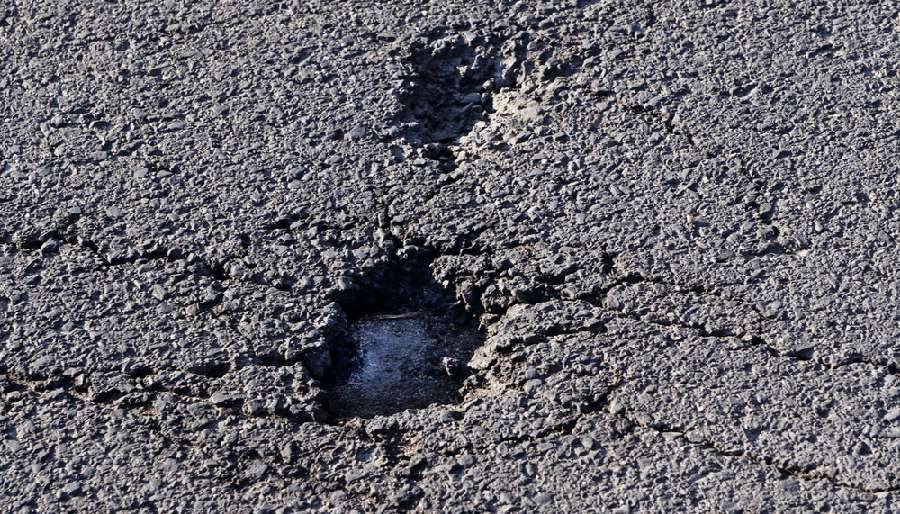A well-maintained parking lot not only enhances the curb appeal of your commercial property in Morris County but also ensures safety for your customers, tenants, or employees.
However, even with the best care, parking lots are always subject to wear and tear over time, leading to signs that indicate the need for repaving.
For commercial property owners in Morris County, recognizing these signs early can save time and money while improving the overall look and function of the property.
Common Signs of Deterioration in Parking Lots
Whether you manage a large commercial parking area or a small residential lot, the signs of deterioration are often similar.
Below, we discuss the most common signs that indicate it’s time to consider repaving your parking lot.

1. Cracks and Potholes
Cracking is one of the earliest signs of damage. Small cracks may seem harmless, but over time, they allow water to seep below the surface, causing further deterioration.
This is especially true in the winter months, when water freezes and expands, worsening the damage.
Potholes, on the other hand, are not only unsightly but dangerous.
These depressions in the surface can cause tripping hazards for pedestrians and damage to vehicles.
If you notice cracks or potholes, it’s crucial to address them immediately.
In most cases, repaving is a more efficient and long-lasting solution than continuous patching, especially if the damage is widespread.
For properties in Boonton Township, keeping parking lots free of potholes is essential for safety and property value.
2. Pooling Water
After a rainstorm, do you notice standing water in certain areas of your parking lot?
Pooling water is a clear sign of drainage issues.
While minor puddles may not seem like a significant concern, they indicate that your parking lot’s grading and slope are no longer effective.
Over time, stagnant water will seep into cracks, accelerating the deterioration process.
If water doesn’t properly drain off your lot, it’s time to consider repaving.
This process ensures a smooth and correctly graded surface, minimizing future damage.
For properties in Parsippany-Troy Hills, proper drainage is key to preventing long-term structural issues.

3. Faded or Discolored Asphalt
Another sign of aging parking lots is faded or discolored asphalt.
Freshly paved lots have a rich, dark color, but over time, UV rays and weather exposure cause the surface to fade.
While fading itself isn’t a structural issue, it signals that your lot is becoming more brittle and prone to cracks.
If your parking lot in Chatham Borough is starting to look faded, repaving can help restore its aesthetic appeal and improve its durability.
4. Warping or Buckling
When you walk or drive over your parking lot, does the surface feel uneven?
Warping or buckling usually occurs due to poor construction or underlying soil issues.
This is particularly common in areas with heavy traffic, where the weight of vehicles pushes the asphalt out of place.
If sections of your parking lot are buckling or warping, you’ll need more than a simple repair.
Repaving is often the best solution to ensure a smooth, even surface, which is critical for high-traffic areas like Florham Park.
5. Failing Sealcoating
Sealcoating is a protective layer that we apply to asphalt parking lots and driveways to shield them from damage caused by rain, UV rays, and chemicals like oil and gasoline.
Over time, this coating wears away, leaving the asphalt exposed.
If you notice that your sealcoat is no longer intact, it’s time to consider repaving.
Maintaining the sealcoat is essential for parking lots in East Hanover, where seasonal weather changes can accelerate wear and tear.

6. Uneven Surface and Trip Hazards
Trip hazards are a liability for any property.
Uneven surfaces, cracks, or areas where the asphalt has sunken can cause injuries.
If your parking lot in Jefferson Township has visible trip hazards, it’s time to consider repaving for safety reasons.
7. Frequent Repairs and Patching
Are you constantly repairing your parking lot?
If patching has become a regular occurrence, it may be time to invest in repaving instead of continuing with short-term fixes.
Frequent repairs often signal that the surface has reached the end of its lifespan and a new layer of asphalt is needed for long-term durability.
If your parking lot in Madison requires frequent repairs, repaving will likely save you money in the long run.
8. Poor Curb Appeal
For businesses, curb appeal is everything.
An old, damaged parking lot sends the wrong message to customers and clients.
If your parking lot in Morristown is filled with cracks, potholes, and faded lines, it’s time to consider repaving to boost your property’s appearance.

9. Loose Gravel and Debris
Over time, asphalt can deteriorate to the point where loose gravel and debris become a constant issue.
Not only does this look unprofessional, but it also poses a risk to vehicles.
If you’re constantly sweeping up debris, it’s a sign that your parking lot is breaking down and needs to be repaved.
For residential properties in Randolph, keeping the driveway and parking areas clean and free of debris is important for both safety and appearance.
10. Age of the Parking Lot
Most parking lots last about 15 to 20 years, depending on usage and maintenance.
If your parking lot in Morris County is nearing the end of its lifespan, it may be time to plan for repaving, even if it still looks relatively good.
Regular maintenance and repairs can only prolong the surface for so long before repaving becomes necessary.
For older parking lots in Denville, repaving will help extend the life of the lot and prevent future costly repairs.
When to Repave vs. Resurface
Not all parking lots need a full-depth replacement. Sometimes, resurfacing—adding a new layer of asphalt over the existing surface—can restore your lot’s functionality and appearance.
However, if your lot has severe damage, underlying structural issues, or drainage problems, repaving is the better option.
If you’re unsure whether resurfacing or repaving is right for your parking lot in Montville, a professional inspection will help determine the best course of action.

Protect Your Investment with Professional Repaving
Recognizing the signs of a deteriorating parking lot early can save you from more extensive (and expensive) repairs in the future.
Whether you’re managing a residential driveway or a large commercial parking area, repaving can significantly enhance both the functionality and appearance of your commercial property.
For expert advice and professional repaving services, contact Morris County Paving.
We proudly serve various areas, including Butler, Chester Borough, and Kinnelon.
Don’t wait until the damage worsens—protect your investment by addressing parking lot issues today.
 Parking Lot Repaving FAQs
Parking Lot Repaving FAQs
How often should I sealcoat my parking lot?
Sealcoating is an essential maintenance procedure for asphalt parking lots, helping to protect the surface from the damaging effects of NJ weather, UV rays, and chemicals.
On average, a parking lot should be sealcoated every 3 to 4 years.
However, the frequency may change depending on factors such as traffic volume, weather conditions, and overall wear and tear.
Regular sealcoating not only extends the life of the asphalt but also maintains the appearance of the lot by restoring its dark, rich color.
Should repaving a parking lot be capitalized?
Yes, repaving a parking lot should typically be capitalized as part of capital expenditures.
Repaving is considered a significant improvement to the property, which extends its useful life and enhances its value.
This differs from regular maintenance expenses, such as minor repairs or patching, which are often deducted as operational expenses.
By capitalizing repaving, the cost is spread over the expected lifespan of the improvement, typically through depreciation.
What is the life span of an asphalt parking lot?
The life expectancy of a commercial asphalt parking lot generally ranges from 15 to 20 years.
Several factors influence this, including the quality of the original installation, the level of maintenance, traffic loads, and weather conditions.
Regular maintenance, such as sealcoating, crack repairs, and prompt drainage management, can help extend the lifespan of the asphalt.
However, once the parking lot shows signs of extensive cracking, potholes, or structural damage, repaving may be necessary.
What does resurfacing a parking lot mean?
Resurfacing a parking lot involves applying a new layer of asphalt over the existing surface without removing the entire pavement.
This process is typically done when the asphalt is in relatively good condition but has surface-level wear, such as minor cracks or fading.
Resurfacing helps restore the smoothness and appearance of the parking lot while extending its life by reinforcing the top layer.
However, it is important to note that resurfacing is not a solution for deeper structural issues; in those cases, full repaving may be required.


 Parking Lot Repaving FAQs
Parking Lot Repaving FAQs